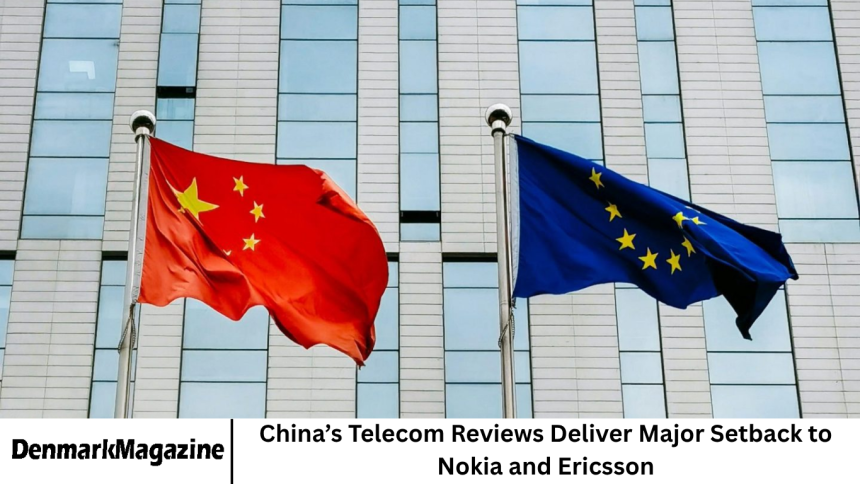In a surprising development that has rattled global telecom markets, China’s Ministry of Industry and Information Technology (MIIT) has launched a sweeping review of foreign telecommunications equipment — a move that has reportedly stalled major deals involving European giants Nokia and Ericsson.
- Background — The Longstanding Relationship Between China and European Telecom Firms
- What the Reviews Entail
- The Market Impact — Billions in Delayed Contracts
- The Geopolitical Undercurrents — Retaliation or Realignment?
- Reactions from Nokia and Ericsson
- The Rise of Huawei and ZTE Amid the Slowdown
- Implications for Global 5G and 6G Development
- Financial and Strategic Outlook
- The Broader Technology Decoupling Trend
- The Road Ahead — Cooperation or Competition?
- Frequently Asked Question
- Conclusion
The decision comes at a time when China is rapidly expanding its 5G infrastructure and investing heavily in next-generation digital networks. For Nokia and Ericsson, two of the world’s top non-Chinese telecom suppliers, the reviews represent not only a regulatory hurdle.
But also a strategic setback in one of the largest telecom markets on the planet. Industry analysts suggest that the reviews are part of a broader geopolitical and economic recalibration, reflecting how technology and trade have become deeply intertwined with national security and industrial policy concerns.
More Read: Quantum Stocks Rigetti Computing and D-Wave Soar Double Digits — Here’s What’s Fueling the Surge
Background — The Longstanding Relationship Between China and European Telecom Firms
For decades, Nokia (Finland) and Ericsson (Sweden) have been key partners in China’s telecom growth story. From the early rollout of 2G networks in the 1990s to today’s 5G ambitions, both companies have provided essential hardware, software, and technical expertise to Chinese carriers such as China Mobile, China Telecom, and China Unicom.
However, their presence in China has always existed in a complex ecosystem dominated by local champions, most notably Huawei and ZTE. As Chinese firms became global powerhouses, the balance of dependency began to shift. While Ericsson and Nokia were once indispensable.
Their roles have gradually diminished as Beijing prioritized domestic innovation and supply chain independence. The new telecom reviews mark a sharp escalation in this trend — signaling that foreign suppliers may face even tougher scrutiny going forward.
What the Reviews Entail
According to reports from industry insiders and regulatory filings, China’s telecom review process involves comprehensive inspections of network security, data handling, and supply chain transparency. In practice, that means every piece of imported telecom equipment must pass a rigorous series of checks to ensure it does not pose “national security or cybersecurity risks.”
This process is neither new nor unexpected — but its expanded scope and heightened enforcement have caught foreign companies off guard. Several sources claim that shipments and approvals for new base stations, routers, and software updates from Nokia and Ericsson have been delayed for months, affecting both deployment schedules and cash flow projections.
One telecom executive, speaking anonymously to a European outlet, said: “The new layer of security checks is not just about technology; it’s about leverage. Every delay sends a message about who controls access to the market.”
The Market Impact — Billions in Delayed Contracts
China represents one of the largest 5G markets globally, with an estimated 2 million base stations already deployed and plans to expand into 6G research and pilot programs by 2030. Nokia and Ericsson together account for roughly 10–15% of China’s telecom infrastructure contracts, according to market data from 2024.
While that may seem small, the sheer scale of China’s network makes it a multi-billion-dollar revenue source for both companies. However, due to the ongoing reviews, several planned deals for 5G expansion and private industrial networks have reportedly been suspended or slowed down.
Analysts estimate that the delays could impact up to $1.5–$2 billion in potential revenue for the two companies in 2025 alone.
- In response, shares of both firms have shown volatility.
- Nokia’s stock dropped around 6% in European trading after the review news surfaced.
- Ericsson’s shares slid by nearly 5%, as investors worried about prolonged exposure to regulatory uncertainty in China.
The Geopolitical Undercurrents — Retaliation or Realignment?
It’s difficult to separate China’s telecom reviews from the broader geopolitical landscape. The United States and its allies have, over the past several years, restricted Chinese telecom firms like Huawei and ZTE from Western markets, citing national security risks. These restrictions have included bans on equipment sales, 5G participation.
And access to key technologies like semiconductors. China’s recent review of Nokia and Ericsson could be viewed as a reciprocal maneuver — a signal that Beijing is prepared to apply similar standards and pressures to foreign players operating within its borders.
Some analysts believe that the reviews are part of China’s “dual circulation” strategy, which emphasizes internal technological self-sufficiency while maintaining selective engagement with global partners.
Dr. Lin Qiang, a telecommunications policy expert at Tsinghua University, remarked: “This is not purely about retaliation. It’s about establishing a consistent framework that ensures any foreign technology aligns with China’s cybersecurity and industrial development goals.”
Reactions from Nokia and Ericsson
Both companies have responded cautiously to the developments. Nokia released a brief statement saying that it “continues to engage constructively with Chinese regulators and partners to ensure compliance with all applicable standards.” The company emphasized that its “long-term commitment to China remains unchanged.”
Ericsson, meanwhile, stated that it was “monitoring the situation closely” and “working to meet the evolving security and certification requirements.” Neither firm publicly criticized the reviews — a sign of their desire to preserve access to the Chinese market despite the mounting challenges.
However, behind closed doors, executives are reportedly concerned about shifting procurement patterns among Chinese carriers, who may use the review process as an opportunity to pivot more heavily toward domestic suppliers.
The Rise of Huawei and ZTE Amid the Slowdown
While Nokia and Ericsson face scrutiny, Huawei and ZTE appear to be capitalizing on the opportunity.
After years of sanctions and restrictions in Western markets, both companies have doubled down on their domestic expansion efforts. Huawei, in particular, has seen a dramatic resurgence, bolstered by the launch of its homegrown 5G chips and expanding influence in the industrial Internet of Things (IoT) and AI-driven telecom solutions.
Industry observers believe that the telecom reviews will tilt procurement further toward domestic players, aligning with China’s push for “technology sovereignty.”
A senior analyst at Counterpoint Research noted: “Every delay for foreign firms becomes an advantage for local ones. The message is clear: China wants to rely on itself.”
Implications for Global 5G and 6G Development
The fallout from China’s telecom reviews extends far beyond its borders. If Nokia and Ericsson are effectively sidelined or constrained, global 5G development could become increasingly bifurcated — with Western markets using European technologies and Asian or Global South markets leaning on Chinese systems.
This fragmentation poses significant challenges for interoperability, cybersecurity, and supply chain efficiency. Moreover, the global race toward 6G development — which is expected to define the next decade of connectivity — could become even more politically charged.
Without robust cross-border collaboration, experts warn that innovation could slow and costs could rise, leaving developing economies caught between competing ecosystems.
Financial and Strategic Outlook
For Nokia and Ericsson, the setback in China comes at a time when both are already under pressure from sluggish 5G demand in North America and rising competition in Europe and India.
To offset potential revenue losses, the companies are expected to:
- Diversify into private 5G and enterprise networks, focusing on manufacturing, logistics, and defense sectors.
- Expand in emerging markets such as Southeast Asia, Africa, and Latin America.
- Invest in software and cloud-native networks to reduce dependence on hardware revenue streams.
Meanwhile, European policymakers may see the reviews as further evidence of China’s protectionist tilt, potentially fueling calls for reciprocal restrictions on Chinese telecom suppliers in Europe.
The European Commission is reportedly exploring ways to coordinate telecom infrastructure policy to ensure “reciprocity and fair competition,” a signal that technology decoupling between China and the West could accelerate.
The Broader Technology Decoupling Trend
This episode is part of a larger global pattern. Over the past five years, countries have increasingly viewed telecommunications infrastructure as a strategic asset rather than just an economic one. The United States, European Union, Japan, and India have all introduced policies to secure their supply chains and limit exposure to foreign technology dependencies.
China’s telecom reviews reinforce this trend — each side tightening oversight and asserting sovereignty over its digital backbone. The result could be a split global internet architecture, where Western and Chinese standards diverge sharply, creating a “digital iron curtain” that shapes innovation, data flow, and commerce for decades to come.
The Road Ahead — Cooperation or Competition?
Despite the growing tensions, it’s not all doom and gloom. Some experts argue that China’s reviews could eventually lead to clearer rules and more predictable standards, allowing foreign companies to adapt and re-engage on more stable terms.
Others are less optimistic, warning that the reviews are the first step toward gradual exclusion — a soft phase-out of foreign participation in China’s critical digital sectors.
For Nokia and Ericsson, the path forward will depend on:
- Diplomatic engagement between China and the EU
- Adaptation to local compliance frameworks
- Innovation in niche markets where they can maintain technological leadership
As global telecom transitions toward 6G, satellite integration, and AI-optimized networks, collaboration will remain both necessary and difficult.
Frequently Asked Question
Why did China begin reviewing Nokia and Ericsson’s telecom equipment?
China’s Ministry of Industry and Information Technology launched expanded reviews to ensure all foreign telecom equipment meets its cybersecurity and national security standards. While similar policies existed before, the current scope is broader and more stringent, signaling a desire for tighter control over foreign technology infrastructure.
Are these reviews linked to geopolitical tensions with the West?
Yes, indirectly. Many analysts view the reviews as part of China’s broader response to Western restrictions on Huawei and ZTE. The move underscores a trend toward technological self-reliance and reciprocal scrutiny in the global telecom landscape.
How much revenue could Nokia and Ericsson lose from these delays?
Estimates suggest that the companies could lose between $1.5 billion and $2 billion in potential 2025 revenue due to suspended or delayed contracts with Chinese carriers.
How have Chinese telecom companies like Huawei benefited from this situation?
Huawei and ZTE stand to gain from the regulatory bottleneck, as Chinese carriers may pivot to domestic suppliers to avoid disruptions. This aligns with Beijing’s strategy of prioritizing local innovation and reducing dependence on foreign technologies.
What does this mean for global 5G and 6G development?
The reviews may accelerate technological fragmentation, dividing the world into separate ecosystems — one dominated by Western suppliers and another by Chinese standards. This could impact global interoperability and innovation.
Could Europe retaliate with similar reviews on Chinese equipment?
Possibly. The European Union has already discussed creating more consistent telecom policies to ensure reciprocity. Some countries, like Sweden and Denmark, have even restricted Huawei equipment in national networks.
What’s next for Nokia and Ericsson in China?
Both companies plan to comply with the reviews and maintain their presence in China, though their long-term strategies will likely shift toward diversification. They may prioritize software-driven solutions and partnerships in less politically sensitive regions.
Conclusion
China’s telecom reviews mark a pivotal turning point — not only for Nokia and Ericsson but for the global technology landscape. What began as a routine regulatory process has evolved into a symbol of shifting global power dynamics, illustrating how technology, politics, and economics have merged into a single competitive arena.
Whether this moment leads to a more balanced digital order or a deepened technological divide remains uncertain. But one thing is clear: the rules of global telecom are being rewritten, and companies like Nokia and Ericsson must navigate an increasingly fragmented world — one where access, trust, and strategy are as crucial as innovation itself.








